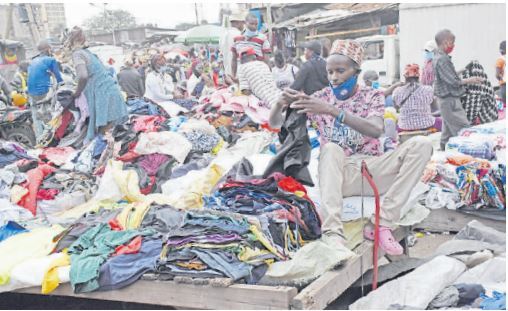Businesses are among the targeted lot in improving their operating environment as the Finance Bill 2025 moves to public participation, in one of the rare bills that has not gone hard on taxes.
This, even as the government faces significant financing challenges for the proposed Sh4.2trillion 2025-26 budget which was revised downwards from Sh4.3 trillion.
Following the deadly anti-Finance Bill protests last year, the government opted to go slow on taxation, with Treasury PS Chris Kiptoo describing this year’s bill before Parliament as “fair”.
“This time we have said we really don’t want to focus on raising more revenue by increasing tax rates. Instead, we just focus on areas that ensure we have fairness and equity in the tax system and make sure we broaden the tax base. We focus more on tax administration so that KRA can be able to reach out to all the potential taxpayers and make sure they are in the bracket,” Kiptoo said.
The 2025-26 financial year’s total projected revenues have been revised downward to Sh 3.31 trillion (17.2% of GDP), compared to Sh3.38 trillion (17.6% of GDP) in the 2025 Budget Policy Statement (BPS).
This includes ordinary revenue of Sh2.75 trillion and Appropriations-in-Aid of Sh559.9 billion, reflecting an upward revision of Sh11.1 billion in AiA–revenue received by government departments or agencies and retained to meet their specific expenditures, instead of being paid into a general consolidated fund.
The reduced revenue projections highlight limited opportunities for introducing new taxes while expenditure pressures continue to rise, according to Treasury.
To support businesses as opposed to increasing taxes, Treasury has proposed a number of measures among them allowing businesses to use unpaid tax to offset VAT obligations. This as VAT claims timelines are proposed for a reduction from 24 months to 12 months.
Turnover Tax (TOT), the primary tax for many small businesses, remains at 1.5 per cent. This is a simplified taxation on the gross sales and is filed monthly through the Kenya Revenue Authority’s (KRA) iTax platform.
The business community through the Kenya National Chamber of Commerce and Industry (KNCCI) has however called to on the government to consider lowering the rate to 0.5 per cent with no additional tax for small and medium enterprises (SMEs).
According to KNCCI president Eric Rutto, the move will help create wider pools for revenue collection as it will encourage more businesses to pay taxes amid growth of enterprises.
Speaking during an event at State House, Nairobi, Rutto also proposed a two-year tax holiday for start-ups alongside the fast-tracking of the Start-up Bill.
“If you give us those tax holidays, two things will happen, one is growth, secondly, you will formalise the SMEs,” he said.
According to the World Bank, less than 30,000 firms of the approximately 1.5 million small businesses in the country are registered with the revenue authority, and only around half of them file taxes regularly.
“As a result, small businesses only contributed less than one percent of total tax revenue,” World Bank notes in one of its recent working papers which highlights to the challenges of designing appropriate tax regimes for small businesses as governments face stark trade-offs between raising revenue, maximising simplicity, and maintaining equity.
Most Sub-Saharan Africa countries (31 out of 48) have introduced a “Simplified Tax Regime” , often referred to as a presumptive or turnover tax regime, to make it easier for small businesses to comply compared to more complex corporate or personal income tax regimes.
The Kenyan government has introduced a simpler tax regime for Micro and Small Enterprises (MSEs) where they can pay taxes through simplified processes including mobile phone payment platforms, with eligible taxpayers only required to keep a daily gross sales record as opposed to preparing complex records of account.
In December, President William Ruto signed seven parliamentary Bills that seek to accelerate the implementation of the Bottom-Up Economic Transformation Agenda.
Among them was the Authority (Amendment) Bill 2024, which gives the Treasury CS the power to waive the penalty payable by an appointed agent who fails to transfer funds collected if the failure was inadvertent.
Others were the Business Laws (Amendment) Bill 2024 which aims to enhance financial stability, boost consumer protection and promote integrity in the financial sector, Tax Procedures (Amendment) Bill 2024 which extended the tax amnesty deadline to June this year and the Tax Laws (Amendment) Bill 2024 which increased the limit for tax-free pension contributions by 50 per cent.
National Assembly has opened a public participation window for Kenyans to submit their views on the Finance Bill, with written submissions accepted until May 27.
“The Bill contains proposals relating to revenue-raising measures, including provisions to ease tax administration and clean up the statute book of terms and cross-references to provisions that have previously been repealed,” said Samuel Njoroge, Clerk of the National Assembly.
Meanwhile, the government has confirmed it will start paying Sh229 billion in verified pending bills to struggling suppliers, a move that will boost their cashflow. About Sh80 billion of the cash is owed to road contractors according to PS Kiptoo.
“We have taken about Sh149 to this year’s budget so once Parliament approves, we will be able to, from July, settle the first amount of pending bills,” Kiptoo said.
by MARTIN MWITA


